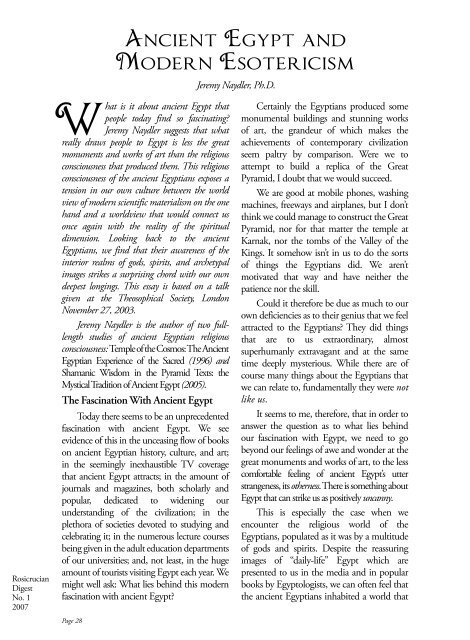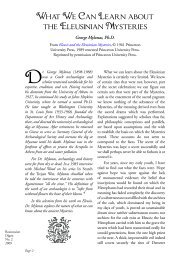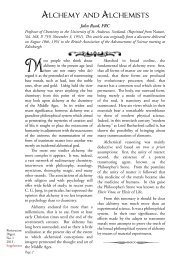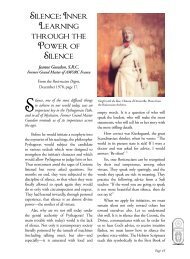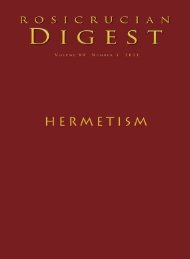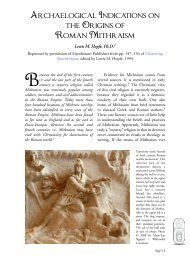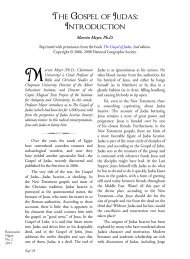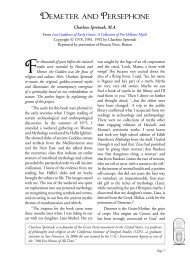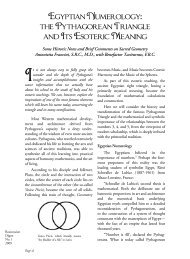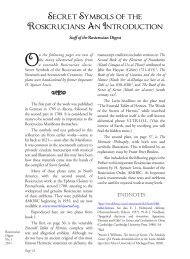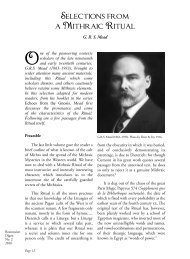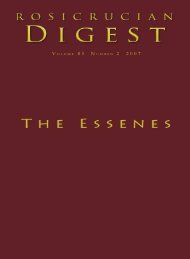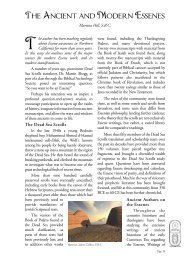Digest - Rosicrucian Order
Digest - Rosicrucian Order
Digest - Rosicrucian Order
You also want an ePaper? Increase the reach of your titles
YUMPU automatically turns print PDFs into web optimized ePapers that Google loves.
Jeremy Naydler, Ph.D.<br />
<strong>Rosicrucian</strong><br />
<strong>Digest</strong><br />
No. 1<br />
2007<br />
What is it about ancient Egypt that<br />
people today find so fascinating?<br />
Jeremy Naydler suggests that what<br />
really draws people to Egypt is less the great<br />
monuments and works of art than the religious<br />
consciousness that produced them. This religious<br />
consciousness of the ancient Egyptians exposes a<br />
tension in our own culture between the world<br />
view of modern scientific materialism on the one<br />
hand and a worldview that would connect us<br />
once again with the reality of the spiritual<br />
dimension. Looking back to the ancient<br />
Egyptians, we find that their awareness of the<br />
interior realms of gods, spirits, and archetypal<br />
images strikes a surprising chord with our own<br />
deepest longings. This essay is based on a talk<br />
given at the Theosophical Society, London<br />
November 27, 2003.<br />
Jeremy Naydler is the author of two fulllength<br />
studies of ancient Egyptian religious<br />
consciousness: Temple of the Cosmos: The Ancient<br />
Egyptian Experience of the Sacred (1996) and<br />
Shamanic Wisdom in the Pyramid Texts: the<br />
Mystical Tradition of Ancient Egypt (2005).<br />
The Fascination With Ancient Egypt<br />
Today there seems to be an unprecedented<br />
fascination with ancient Egypt. We see<br />
evidence of this in the unceasing flow of books<br />
on ancient Egyptian history, culture, and art;<br />
in the seemingly inexhaustible TV coverage<br />
that ancient Egypt attracts; in the amount of<br />
journals and magazines, both scholarly and<br />
popular, dedicated to widening our<br />
understanding of the civilization; in the<br />
plethora of societies devoted to studying and<br />
celebrating it; in the numerous lecture courses<br />
being given in the adult education departments<br />
of our universities; and, not least, in the huge<br />
amount of tourists visiting Egypt each year. We<br />
might well ask: What lies behind this modern<br />
fascination with ancient Egypt?<br />
Page 28<br />
Certainly the Egyptians produced some<br />
monumental buildings and stunning works<br />
of art, the grandeur of which makes the<br />
achievements of contemporary civilization<br />
seem paltry by comparison. Were we to<br />
attempt to build a replica of the Great<br />
Pyramid, I doubt that we would succeed.<br />
We are good at mobile phones, washing<br />
machines, freeways and airplanes, but I don’t<br />
think we could manage to construct the Great<br />
Pyramid, nor for that matter the temple at<br />
Karnak, nor the tombs of the Valley of the<br />
Kings. It somehow isn’t in us to do the sorts<br />
of things the Egyptians did. We aren’t<br />
motivated that way and have neither the<br />
patience nor the skill.<br />
Could it therefore be due as much to our<br />
own deficiencies as to their genius that we feel<br />
attracted to the Egyptians? They did things<br />
that are to us extraordinary, almost<br />
superhumanly extravagant and at the same<br />
time deeply mysterious. While there are of<br />
course many things about the Egyptians that<br />
we can relate to, fundamentally they were not<br />
like us.<br />
It seems to me, therefore, that in order to<br />
answer the question as to what lies behind<br />
our fascination with Egypt, we need to go<br />
beyond our feelings of awe and wonder at the<br />
great monuments and works of art, to the less<br />
comfortable feeling of ancient Egypt’s utter<br />
strangeness, its otherness. There is something about<br />
Egypt that can strike us as positively uncanny.<br />
This is especially the case when we<br />
encounter the religious world of the<br />
Egyptians, populated as it was by a multitude<br />
of gods and spirits. Despite the reassuring<br />
images of “daily-life” Egypt which are<br />
presented to us in the media and in popular<br />
books by Egyptologists, we can often feel that<br />
the ancient Egyptians inhabited a world that


